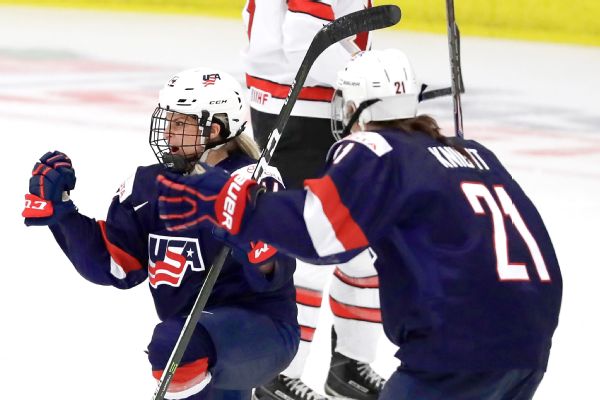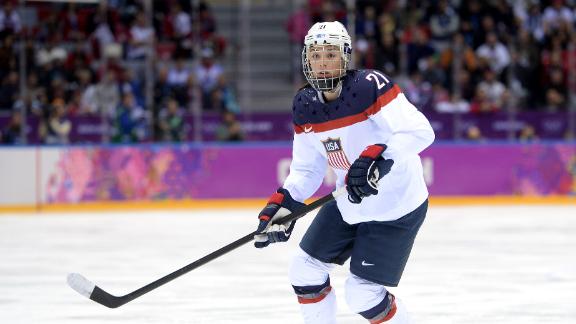PLYMOUTH, Mich. — The U.S. women’s hockey team, fueled and fired up by an opportunity to play in a tournament it was willing to sit out, started fast and strong against its rival in a highly charged and physical game.
Brianna Decker broke a scoreless tie late in the second period and Nicole Hensley stopped 18 shots, lifting the U.S. over Canada 2-0 on Friday night in the International Ice Hockey Federation women’s world championship opener for both teams.
“I know a lot of people didn’t know what to expect from us after having just 48 hours of preparation,” defenseman Monique Lamoureux-Morando said. “But we expect this kind of performance out of ourselves.”
Said Megan Keller, who played defense for the U.S. near her hometown in suburban Detroit: “Built-up energy. We were all excited to get out here and get the first game rolling. It definitely puts into perspective how important these tournaments are and how much they mean to you and your teammates.”
The Americans threatened to pull out of the tournament unless USA Hockey committed to paying the women more and treating them more like their male counterparts.
After getting about $1,000 a month from the organization for six months around the Olympics in the past, members of the U.S. team can now make a living playing the sport. They will make $3,000 to $4,000 a month, with the ability to earn over $70,000 annually with contributions from the United States Olympic Committee. Players can make up to $129,000 with the Olympics in 2018, and USA Hockey also will arrange for players to fly in business class and stay at nicer hotels as part of the deal finalized Tuesday.
“I thought they were outstanding. Really outstanding,” U.S. head coach Robb Stauber said. “It starts in the [locker] room. … I think because of the stand they took, they’re more close-knit than ever. And you want that in a team.
“They turned the page and started focusing on Canada. And at that point, you need to leave everything behind. You’re not going to play like you can if you’re carrying extra baggage.”

Brianna Decker and Team USA won their world championship opener just three days after striking a deal with USA Hockey to avert a boycott.
Dave Ogrean, executive director of USA Hockey, could enjoy the show because the landmark deal paved the way for a highly entertaining game in front of 3,152 fans.
“It’s a terrific night,” Ogrean said after the second period. “We’ve got a wonderful crowd here, USA Hockey arena, and the game everyone came to see, the two best teams in the world are playing at a very high level in an ultra-competitive game. And obviously, you could tell our players had a lot of bottled-up energy that they were ready to play with, especially in the first period.”
The Americans controlled the play all night against their rivals. Gigi Marvin gave them a two-goal cushion early in the third, and their swarming defense shut out a high-powered offense.
Shannon Szabados made some spectacular saves to keep the Canadians in the game and finished with 28 saves, but they couldn’t get a puck past Hensley.
“It was a wake-up call,” Canadian forward Marie-Philip Poulin said. “We have to be ready when they drop the puck.”
Said Canada coach Laura Schuler: “I don’t think we had confidence with the puck tonight. I don’t think we drove the net like I know this team can. At the end of the day that comes down to heart.”
The two teams are heavy favorites to meet again April 7 in the gold-medal game. If that doesn’t happen, it would be stunning and unprecedented.
Since the first IIHF women’s world championship in 1990, the U.S. and Canada have not allowed another country to advance to the finals. The Americans beat the Canadians last year at the world championship, winning the eight-nation tournament for the third straight time over Canada and sixth time in seven opportunities.
They will, though, have to go through the motions in the eight-nation tournament.
The U.S. will face Russia and Canada will look to bounce back against Finland on Saturday as they continue the three-game opening round.
Canadian players had voiced support for the Americans in their battle for better wages and conditions in an at-times contentious off-ice battle, and acknowledged their rivals had a lot on their side.
“They had the home crowd and it was a big thing for female sports and they got it,” Poulin said. “I think it was a big, emotional game for them.”
ESPN’s Johnette Howard and The Associated Press contributed to this report.






